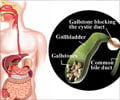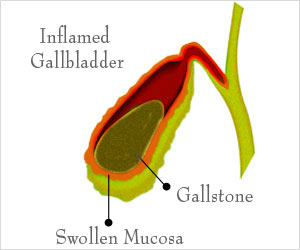Activation of the constitutive androstane receptor (CAR) prevents the formation of cholesterol gall stones.
Highlights
- Cholesterol gallstone disease (CGD) is one of the most common gastroenterological disorders.
- The incidence rate of CGD is increasing because of improved standard of living, a chronic high-cholesterol diet, and over-nutrition.
- New findings show that activation of the constitutive androstane receptor (CAR) reduces biliary cholesterol and prevents stone formation.
In America, around 20 to 25 million adults have or will develop gallstones, representing almost 15% of the population and around 700,000 individuals annually undergo surgical gallbladder removal.
Though gall stones are mostly asymptomatic, around one fifth complain of discomfort and experience recurrent painful episodes. Some can develop complications such as pancreatitis or cholecystitis are possible.
Surgical removal of gallbladder is the only treatment option for gallstones. But the surgery is highly invasive nature, involves risk of side effects, and high cost.
Non-surgically treatment options include oral dissolution with ursodeoxycholate or lithotripsy. But these approaches have a recurrence rate of more than 50%.
"CGD is one of the most common gastroenterological disorders and the incidence rate is increasing because of improved standard of living, a chronic high-cholesterol diet, and over-nutrition." explained lead investigator Jinhan He, PhD, of the Department of Pharmacy, West China.
"Our study indicated that the constitutive androstane receptor (CAR) plays an important role in maintaining the homeostasis of cholesterol and triglyceride levels and its activation may represent a new approach for treating CGD," He added.
Activation of CAR alters the biochemical composition of the gallbladder and hepatic bile for anti-lithogenesis (formation of stones) effects.
Researchers tested the effects of activation of CAR in mice by injecting one group with a medication that stimulated CAR activity, for two weeks. The other group, which served as the control group, were administered control injections.
All mice were fed with either a standard diet or a diet with high-cholesterol/high fat (lithogenic diet), that induced gallstones.
The results showed that among the mice on lithogenic diet, around 94.7% of the non-CAR-stimulant injected mice developed gallstones compared to 33.3% of CAR-stimulant-injected mice.
Tissue Examination
Microscopic inspection of tissue showed striking differences.
Gallbladders of mice in the control group were filled with gallstones composed of bile with aggregated cholesterol crystals.
On the other hand, mice treated with CAR-stimulant-treated showed transparent bile free of cholesterol precipitates.
After two weeks of the lithogenic diet, the walls of the gallbladders of mice in the control group showed evidence of inflammation, which was not noticeable in the treated group.
CAR stimulation also produced related benefits, including enhanced conversion of cholesterol into bile acids and elevation of bile acid re-absorption.
"Collectively, it appears that CAR plays an important role in maintaining the homeostasis of cholesterol, bile acids, and triglyceride levels," commented Dr. He. "Whether CAR could be a novel target in preventing or treating cholesterol gallstone disease in humans remains to be further determined."
The new study is published in The American Journal of Pathology.
Reference
- Jinhan He et al. Activation of Constitutive Androstane Receptor Prevents Cholesterol Gallstone Formation. The American Journal of Pathology; (2017) doi.org/10.1016/j.ajpath.2016.12.013
Source-Medindia












